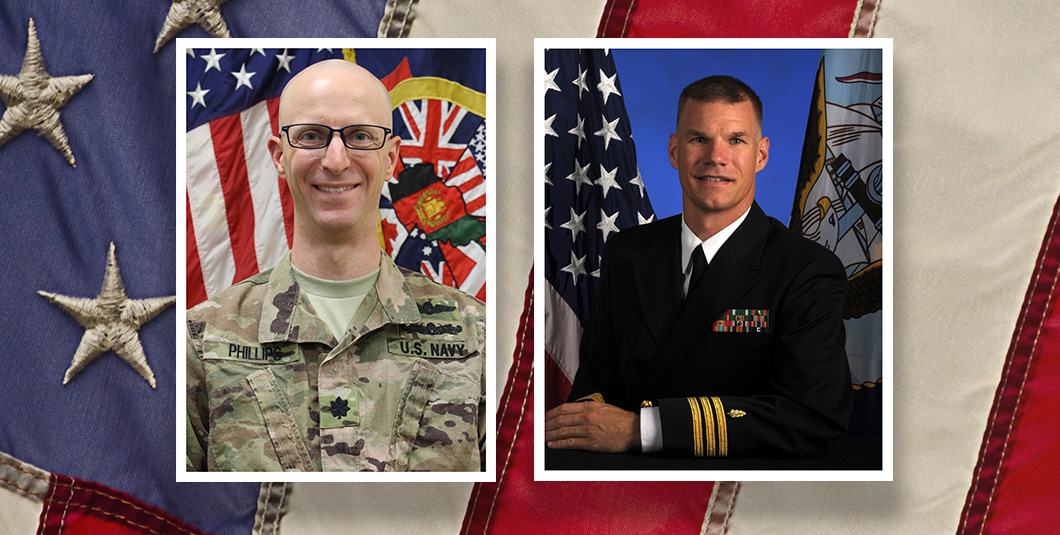Navy Officers Find Bond as 'Wildcats'
Capt. Eric Stedje-Larsen, MD, and Cmdr. Ryan Phillips, MD, had worked with one another in the Navy for years, but on opposite sides of the country, Dr. Stedje-Larsen on the east coast in Portsmouth, Va., and Dr. Phillips on the west coast in San Diego. It wasn’t until last May that they met in person while attending a training in California.
That’s when they learned they had something significant in common – they’re both graduates of the University of Kentucky College of Medicine.
Dr. Stedje-Larsen graduated in 1997, while Dr. Phillips graduated in 2006, so they never crossed paths in medical school. But with their professions in the military so specialized – they’re the only two program directors for an ACGME Pain Medicine Fellowship with the Navy – their shared experience was a rather remarkable discovery.
“That’s the thing about Wildcat fans,” Dr. Stedje-Larsen said. “We find each other.”
Dr. Phillips had been a part of Big Blue Nation all of his life, having grown up in Lexington as a UK fan. He earned his undergraduate degree just 16 miles away at Asbury University and took the opportunity to work at one of UK’s immunology labs during those summers, which allowed him to become familiar with the UK campus.
“I never really considered going to a different medical school after getting that research experience as an undergrad,” Dr. Phillips said. “I liked the campus, and I enjoyed the faculty, so it was a very natural flow to go to UK for medical school.”
Dr. Phillips’s original plan was to become a trauma surgeon. It wasn’t until his residency when he was drawn to pain medicine.
“I didn’t want to be that surgeon who’s not sure that’s what he wants to do,” Dr. Phillips said. “During my residency I had opportunities to work with other specialists, and I learned that pain medicine was the path I wanted to follow.”
Dr. Stedje-Larsen also pursued his undergraduate degree in central Kentucky, attending Transylvania University. Though he didn’t grow up in Lexington, his college experience helped him fall in love with the city, so he stayed there for his medical education.
“I didn’t know anything about this when I signed up,” Dr. Stedje-Larsen said. “My assumption was I would have a job. I thought, ‘How bad could it be?’ Medical school was the same way. I saw people being accepted, and I go, ‘Well, how bad could it be?’”
Both Dr. Phillips and Dr. Stedje-Larsen took advantage of the Health Professions Scholarship Program (HPSP) to help with expenses, such as tuition and living costs, for medical school. Now, they serve as specialty leads for the Navy for complex chronic pain patients, and they find the field to be very rewarding.
Their specialty becomes particularly important and timely – and maybe more complex – amid current issues such as the national opioid crisis. Dr. Stedje-Larsen said he’s able to share his expertise across the Navy through video teleconference so that physicians, physical therapists, pharmacists and more can work together to establish personalized plans to help patients struggling with pain and addiction.
“Our role in trying to curb opiate abuse is to help reduce the need for opiates. That’s our focus,” Dr. Stedje-Larsen said. “Poorly managed pain is everywhere, and I think we both enjoy our expertise because our specialization allows us to help those who are so vulnerable in these struggles.”
During their time with the Navy, the two UK College of Medicine graduates also have traveled to several countries caring for uniformed armed forces members, retirees, and dependents. Dr. Stedje-Larsen completed a year in Guantanamo Bay and went to Iraq in 2004 as part of a combat support unit. Dr. Phillips has been an anesthesiologist in Japan and was deployed in Afghanistan.
“The opportunities the Navy has given me have just been amazing,” Dr. Phillips said.
And with their current positions as program directors for the pain medicine fellowship, they’re training the next generation in a variety of specialties including neurology, family medicine, psychiatry, emergency medicine and physical medicine and rehabilitation.
They agree pursuing pain medicine in the military was the right path for them. It’s even better now knowing they have a fellow Wildcat to turn to.
